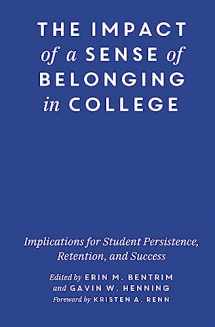
The Impact of a Sense of Belonging in College
Book details
Summary
Description
About the Author
Erin M. Bentrim is a Senior Education & Training Specialist for Assessment at Anthology, Inc. Her higher education portfolio includes management level positions in Institutional Research and Effectiveness, Academic Assessment, Student Affairs Assessment, and Strategic Planning. In addition to her administrative roles, Dr. Bentrim has experience teaching graduate and undergraduate level courses in diverse subject matters including psychology, higher education administration, and educational statistics. Dr. Bentrim is a founding member of the Student Affairs Assessment Leaders (SAAL) organization which serves individuals responsible for implementing assessment on their respective campuses. Dr. Bentrim holds a PhD in Educational Psychology & Research, an MEd in Student Personnel Services, both from the University of South Carolina, and is a Phi Beta Kappa graduate of Wofford College where she earned a BA in English.
Gavin W. Henning is Professor of Higher Education at New England College in New Hampshire where he directs the Master of Science in Higher Education Administration and Doctorate of Education programs. Gavin is a past president of ACPA – College Student Educators International as well as a past president of the Council for the Advancement of Standards in Higher Education (CAS). He has over 20 years’ experience in higher education assessment and institutional research and frequently consults and presents regionally, nationally, and internationally on the topic. His scholarship includes over 90 peer-reviewed presentations and over 90 invited presentations and keynotes regarding assessment. In addition, he has published articles and books on assessment including Student Affairs Assessment: Theory and Practice with Darby Roberts that serves as the foundational text for assessment courses in many higher education graduate programs. Gavin earned his Ph.D. in Leadership and Policy Studies from the University of New Hampshire.
Sense of belonging refers to the extent a student feels included, accepted, valued, and supported on their campus. The developmental process of belonging is interwoven with the social identity development of diverse college students. Moreover, belonging is influenced by the campus environment, relationships, and involvement opportunities as well as a need to master the student role and achieve academic success. Although the construct of sense of belonging is complex and multilayered, a consistent theme across the chapters in this book is that relationship between sense of belonging and intersectionality of identity cannot be ignored, and must be integrated into any approach to fostering belonging.
Over the last 10 years, colleges and universities have started grappling with the notion that their approaches to maintaining and increasing student retention, persistence, and graduation rates were no longer working. As focus shifted to uncovering barriers to student success while concurrently recognizing student success as more than solely academic factors, the term “student sense of belonging” gained traction in both academic and co-curricular settings. The editors noticed the lack of a consistent definition, or an overarching theoretical approach, as well as a struggle to connect disparate research. A compendium of research, applications, and approaches to sense of belonging did not exist, so they brought this book into being to serve as a single point of reference in an emerging and promising field of study.


We would LOVE it if you could help us and other readers by reviewing the book
Book review



